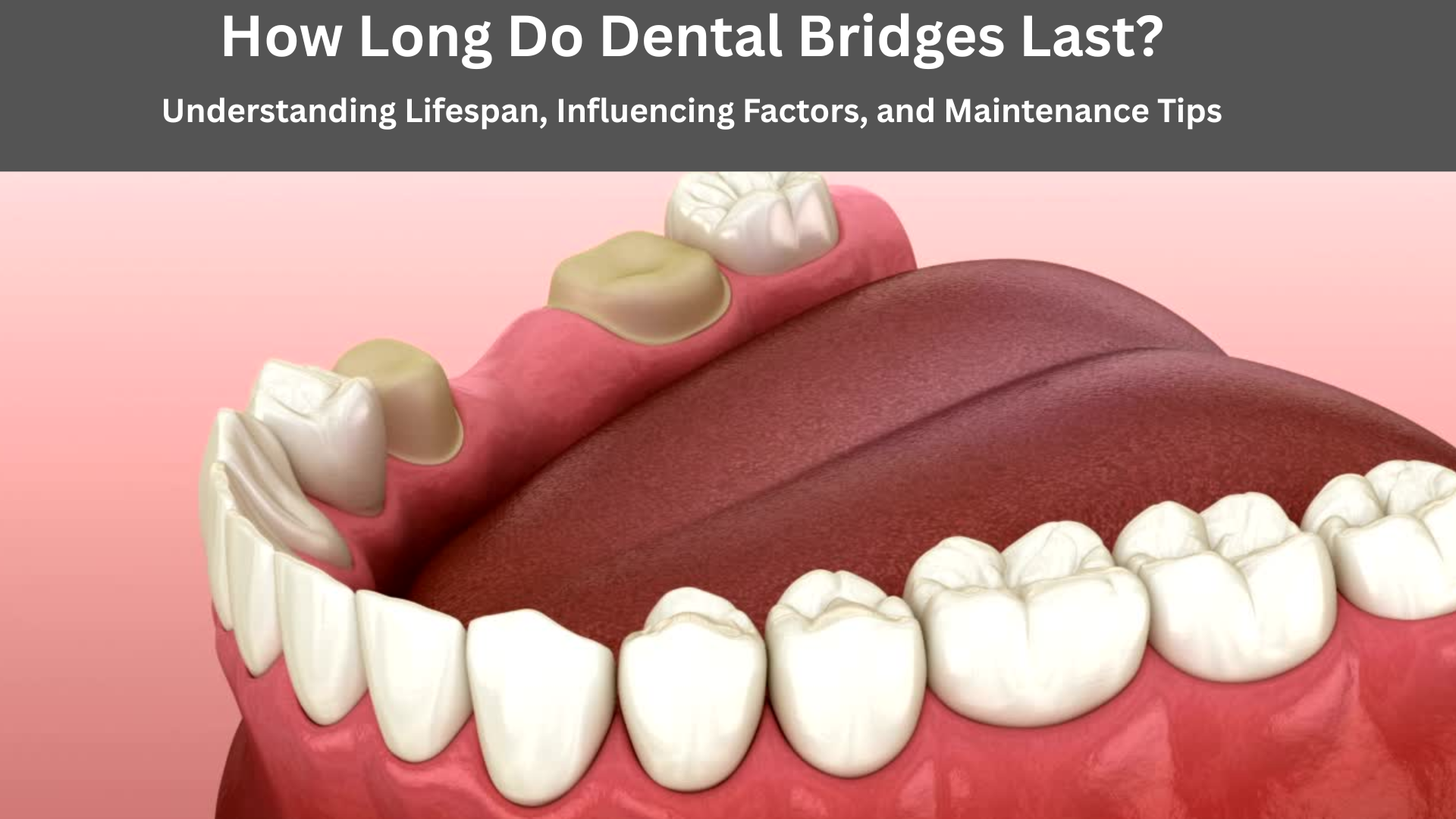
How Long Do Dental Bridges Last
Introduction
Dental bridges are a popular restorative solution for replacing missing teeth. One of the most common questions patients ask is, “How long do dental bridges last?” While they are not permanent, their lifespan can vary depending on several factors. This article delves into the average longevity of dental bridges, what influences their durability, types of bridges, materials used, and tips for prolonging their life.
Average Lifespan of Dental Bridges
- Traditional Bridges: Last 10 to 15 years on average.
- Cantilever Bridges: Slightly shorter lifespan due to single-anchor design — around 7 to 10 years.
- Maryland Bridges: Typically last 5 to 10 years, depending on the bonding strength.
- Implant-Supported Bridges: Can last 15 years or more, especially when well-maintained.
Factors Affecting the Longevity of Dental Bridges
- Type of Bridge Used
Each bridge type has unique structural characteristics influencing durability:
- Traditional: Balanced support, more durable.
- Cantilever: One-sided support makes them prone to loosening.
- Maryland: Relies on resin bonding; vulnerable to detachment.
- Implant-Supported: Most stable due to titanium implant anchorage.
- Material Used
- Porcelain Fused to Metal (PFM): Good strength and aesthetics. Moderate longevity.
- All-Porcelain: Aesthetic but less durable, prone to chipping.
- Zirconia: Extremely strong and biocompatible. Longest-lasting option.
- Metal Alloys: Strongest but not aesthetic—used in molars.
- Oral Hygiene Habits
- Poor cleaning can lead to decay under abutments or around implants.
- Use of floss threaders or water flossers under pontics is crucial.
- Diet and Lifestyle
- Chewing hard foods, teeth grinding, or smoking can reduce lifespan.
- Dental and Periodontal Health
- Healthy supporting teeth and gums increase bridge survival.
- Gum disease or bone loss can weaken the foundation.
- Skill of the Dentist
- Precise fit and occlusal alignment during fabrication matter significantly.
- Poor fit can cause premature wear or recurrent decay.
Signs That a Dental Bridge May Be Failing
- Looseness or movement
- Sensitivity or pain
- Bad breath or bad taste (signs of decay or infection)
- Gum recession around the bridge
- Visible damage or chipping of material
Maintenance Tips to Extend the Life of Dental Bridges
- Brush twice daily using fluoride toothpaste.
- Use interdental brushes or floss threaders to clean under the bridge.
- Avoid chewing hard objects like ice, pens, or hard candy.
- Visit your dentist every 6 months for check-ups and cleanings.
- Use a mouthguard if you grind your teeth at night.
Comparison of Bridge Lifespans by Type & Material
| Bridge Type | Average Lifespan | Common Material Used |
| Traditional | 10–15 years | PFM, zirconia |
| Cantilever | 7–10 years | Metal, zirconia |
| Maryland | 5–10 years | Resin-bonded porcelain |
| Implant-Supported | 15–25 years | Titanium, zirconia |
Conclusion
So, how long do dental bridges last? The answer depends on the type, materials used, oral hygiene, and personal habits. With proper care, a high-quality dental bridge — especially implant-supported zirconia options — can last well over a decade. The key lies in preventive care, choosing the right materials, and regular dental check-ups.
Related Reads
Bridge vs Implant vs Denture: Which Tooth Replacement Option is Best?
Dental Bridge Problems: Causes, Symptoms, and Solutions
How to Clean Under Dental Bridge: Effective Techniques
Best Bridge Material for Front Teeth: A Complete Guide for Long-Lasting Smile
FAQs About Dental Bridge Longevity
- Can a dental bridge last a lifetime?
While possible, it’s rare. Most bridges last 10–15 years but can last longer with exceptional care. - Can a bridge be repaired or must it be replaced when damaged?
Minor chips may be repaired, but structural issues usually require full replacement. - Does insurance cover dental bridge replacements?
Many plans partially cover replacements after a certain time (often 5 years). - Can I replace a bridge with an implant later?
Yes, especially if bone density is adequate. - What is the cost difference between short- and long-lasting bridges?
Zirconia or implant-supported options cost more initially but may offer better value over time. - Can poor oral hygiene shorten the lifespan of my bridge?
Yes. Gum disease, decay, and infections can lead to early failure. - Are there age restrictions for getting long-lasting bridges?
Not necessarily. Health status and bone quality are more important than age. - What is the weakest link in a traditional bridge?
The natural abutment teeth—they’re prone to decay or fracture over time. - Is bone loss a concern with bridges?
Yes, especially under the pontic where the bone is not stimulated. - Should I avoid certain foods if I have a bridge?
Yes. Avoid sticky or hard foods to prevent loosening or damage.
